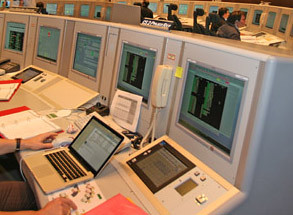Spectrum & Bankruptcy
Wednesday, May 7th, 2014
FightSquared is about to be resolved.
After “lawyering up” for the last few years, here comes the judge. She suggested everybody coffee-up for Thursday’s hearing.
Don’t call him “Nixon,” as Charlie seldom ever loses a hand in this game.
Here’s the latest tit-for-tat, via The Deal Pipeline…
“Mr. Ergen’s testimony cannot be believed,” said debtor counsel Andrew Leblanc of Milbank, Tweed, Hadley & McCloy LLP.
Dish Network Corp. chairman Ergen, who holds more than $1 billion in secured claims including interest, is the sole objector to the reorganization of Philip Falcone-backed LightSquared.
Leblanc told the court that Ergen impeached himself 27 times during testimony earlier in 2014 by disagreeing with his deposition before the trial.
LightSquared and supporting creditors are trying to convince Judge Shelley Chapman of the U.S. Bankruptcy Court for the Southern District in New York that the debtor should be able to give Ergen different compensation for his secured claims than other creditors holding secured debt. The plan supporters also want Chapman to designate, or disqualify, Ergen’s vote.
The debtor plans to repay Ergen’s first-lien debt with a third-lien note that would not pay cash for seven years, unless it were refinanced. Other secured creditors would receive cash payments in full shortly after confirmation of the plan.
Ergen’s counsel, Rachel Strickland of Willkie Farr & Gallagher LLP, called the plan “totally unjust and in violation of the [Bankruptcy] Code,” in court Monday.
LightSquared sought Chapter 11 protection two years ago. The debtor was unable to fund its business when the Federal Communications Commission withdrew support for a proposal that would allow LightSquared to use is spectrum — which is licensed for hybrid satellite-terrestrial service — for wholesale wireless broadband service.
The confirmation hearing has focused as much on Ergen’s alleged misdeeds as it has on the plan supported by Fortress Investment Group, Melody Capital Advisors LLC, Philip Falcone’s Harbinger Capital Partners LLC and JPMorgan Chase & Co.
LightSquared argues that the plan, which incorporates $2.65 billion in new financing, compensates all creditors fully and fairly.
Ergen’s lawyers told Chapman that the debtors are buying the votes of junior classes by giving them better treatment than the Dish chairman. “They are patting themselves on the back for get a fully consensual plan?” Strickland asked the court. “They are trying to work around the [Bankruptcy] Code.”
Strickland called the effort to divide the secured debt into two classes a “completely unprecedented maneuver.”
LightSquared and creditors argue that Ergen violated a credit agreement by purchasing the claims, because terms of the loan blocked competitors such as Dish from purchasing the debt.
The debtor also accuses Ergen of disrupting its reorganization, and notes that another judge in the Southern District of New York designated Dish’s vote in the reorganization of DBSD North America Inc. Dish wound up buying the satellite communications company.
Dish offered $2.22 billion to purchase LightSquared’s most attractive portfolio of wireless licenses last year. LightSquared said the offer undervalued the debtor, though a group of secured creditors proposed a reorganization of a unit of the company built around Ergen’s offer.
Dish withdrew the bid in January, after termination dates for the deal passed. Chapman ruled that the company had the legal right to terminate.
LightSquared has negligible operations. The value of the debtor’s estates lies in its spectrum, and will swing widely depending on the FCC’s ruling on licensing.
Leblanc told Chapman that Ergen plays “the long game,” and would attempt to buy the company on the cheap if he could disrupt the reorganization plan. The lawyer noted that Dish’s purchase of DBSD played out over a long period, and predicted that the satellite TV company still has an interest in LightSquared and its wireless spectrum.
Know when to hold em, know when to fold em.








